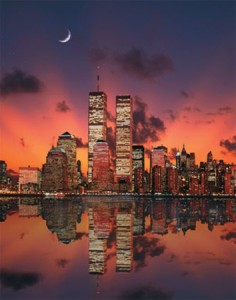Forty years ago, my grandfather took my dad to Lower Manhattan to see the World Trade Center, then under construction. This year, my dad and I went to see a new World Trade Center being built on the same site.
I am a New Yorker by birth, and although I grew up in the suburbs, I visited the city hundreds of times in my childhood. I still feel a strong emotional connection to the city and its beautiful skyline — the chaotic mix of brick and steel, the graceful Chrysler Building and the proud Empire State Building. But whenever my family drives over the George Washington Bridge, I look to the right and still expect to see the Twin Towers at the far end of Manhattan Island. The towers dwarfed everything else.
I remember driving past the towers’ bases in 1999. Sitting in the backseat, I tried to crane my neck back and see the top of the Twin Towers, but I couldn’t. They were so tall — they went beyond my range of sight. They were supremely ugly buildings, but they were ours. Today’s skyline looks incomplete without the World Trade Center.
Sept. 11 was a bizarre day. While at school, parents kept showing up to take their kids home. Teachers whispered to each other with concerned looks. I remember being confused when we weren’t allowed to go outside for recess, supposedly because of “bug spray” on the field.
It was only in the car after school, on the way to get ice cream, that my mom told me what had happened to the World Trade Center.
I saw some photographs of the attacks, but my parents mostly shielded me from the horrific images. For that, I’m grateful. Those few pictures alone were enough to scare the hell out of me. Fire alarms, every sound in the night and the prospect of flying terrified me for months afterward.
Since we lived so close to New York City, the fear was intense — weighing on everyone’s mind. My town went to war on Sept. 11 — nearly all the policemen, EMTs and firefighters were called from our county down to Ground Zero. Following the attacks, my school held supply drives for the troops being sent to faraway Afghanistan. I didn’t lose any close relatives on Sept. 11, but I had several who escaped with remarkable stories to tell. Other kids weren’t so lucky.
The fear eased with time, as it did everywhere in America. Today, I can still observe the effects of Sept. 11 on my home turf.
New Yorkers have always been known for bluntness and dark humor, but a certain sense of fatalism now permeates the local culture. I know many adults that still talk about the friends and relatives they lost. First responders and survivors struggle with lingering medical problems due to the toxins they breathed in following the WTC’s destruction. Some people in the neighborhood even have symptoms of post-traumatic stress disorder.
Memorials to the attacks have been built throughout my school district. Photos of alumni now in the military plaster the walls of my high school. And whenever I visit Lower Manhattan, I see dozens of empty storefronts, left vacant since the cleanup of Ground Zero.
Simultaneously, though, the Twin Towers are transitioning from recent memory to historical fact — especially since their successor is more than half done. After years of delay and convoluted real estate deals, the gleaming new Freedom Tower is going up faster than you can imagine. Nonetheless, the Freedom Tower, regardless of its beauty, will never replace the original World Trade Center. Not for me. Not for a lot of us.
Forty years from now, I’ll be on my way to old age and retirement. At some point, I will surely take my family to see the Ground Zero memorial, adjacent to the Freedom Tower.
Will words be enough to convey to my grandchildren the intense emotions and memories conjured up by Ground Zero? Will I ever be prepared for the surreal sensation of standing in the memorial grounds, looking up into the empty sky and just remembering?
Gorman, Jr. is a member of
the class of 2014.



